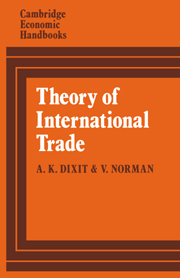Book contents
- Frontmatter
- Preface
- Contents
- 1 THE THEORY OF INTERNATIONAL TRADE
- 2 SUPPLY AND DEMAND USING DUALITY
- 3 INTERNATIONAL EQUILIBRIUM AND THE GAINS FROM TRADE
- 4 TRADE, SPECIALIZATION AND FACTOR PRICES
- 5 COMPARATIVE STATICS
- 6 WELFARE AND TRADE POLICY
- 7 MONEY AND THE BALANCE OF PAYMENTS
- 8 TRADE AND PAYMENTS WITH FIXED PRICES
- 9 SCALE ECONOMIES AND IMPERFECT COMPETITION
- MATHEMATICAL APPENDIX
- BIBLIOGRAPHY
- INDEX
9 - SCALE ECONOMIES AND IMPERFECT COMPETITION
Published online by Cambridge University Press: 19 January 2010
- Frontmatter
- Preface
- Contents
- 1 THE THEORY OF INTERNATIONAL TRADE
- 2 SUPPLY AND DEMAND USING DUALITY
- 3 INTERNATIONAL EQUILIBRIUM AND THE GAINS FROM TRADE
- 4 TRADE, SPECIALIZATION AND FACTOR PRICES
- 5 COMPARATIVE STATICS
- 6 WELFARE AND TRADE POLICY
- 7 MONEY AND THE BALANCE OF PAYMENTS
- 8 TRADE AND PAYMENTS WITH FIXED PRICES
- 9 SCALE ECONOMIES AND IMPERFECT COMPETITION
- MATHEMATICAL APPENDIX
- BIBLIOGRAPHY
- INDEX
Summary
The models of trade considered in Chapters 1–6 were all concerned with the theory of comparative advantage and its ramifications. In this chapter we return to questions of trade, but with the important difference that we now look at trade in the context of economies of scale. It is well-known and fairly obvious that scale economies create potential gains from trade–it simply reflects Adam Smith's observation that the division of labour is limited by the extent of the market. It is also quite apparent that scale economies matter empirically. In particular, the large volume of intraindustry trade–estimated at 50% of world trade by Grubel and Lloyd (1975)–can only be understood within the context of product differentiation and economies of scale. Both theoretically and empirically, therefore, there is a strong case for explicit analysis of the importance of non-convexities for trade.
It is not easy to give a precise treatment of trade based on scale economies. The difficulties relate to the market structure under which such trade will occur. Perfect competition is in general incompatible with economies of scale, so some form of imperfect competition will prevail. For descriptive purposes, one must then choose among the numerous alternative ways in which imperfect competition can be modelled; and the conclusions one arrives at will in general depend on the particular specification chosen. To arrive at a general theory of trade with imperfect competition is therefore impossible; the most one can hope for is a catalogue of special models.The same goes for welfare assessments.
- Type
- Chapter
- Information
- Theory of International TradeA Dual, General Equilibrium Approach, pp. 265 - 296Publisher: Cambridge University PressPrint publication year: 1980



